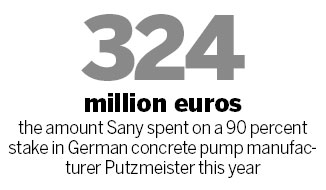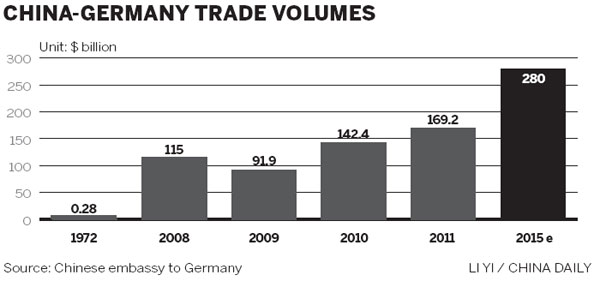
|
A worker at the Sany plant in Germany. Sany's German growth is taking place as it gains a manufacturing presence in India, Brazil and the United States. Fu Jing / China Daily |
At the heart of Europe, the nation's economy has remained strong throughout the euro crisis, reports Fu Jing from Bedburg, Germany.
A 30-minute ride from the German city of Dusseldorf takes you to Bedburg, where there is a road called Sany Allee, along with a bus stop bearing this name.
The road leads to the gate of China's biggest green field investment in Europe so far, the German operations of heavy equipment manufacturer Sany Group Co Ltd.
Work is already in full swing at the No 1 production hall of Sany's factory, which has given a new lease of life to this former mining area in the Ruhr, Germany's industrial heart.
And plans are afoot to build the No 2 production hall at the factory, which mainly manufactures heavy construction equipment for the European and African markets
Involving a total investment of 100 million euros ($125 million), Hunan province-based Sany's factory, which took a year to build, opened for business in 2011.

The group set up Sany Germany Co Ltd in the German city of Cologne as its European headquarters in 2008, its third overseas regional headquarters and investment region after India and the United States. It also has offices in France, Italy, Poland and Turkey
Christiane Linkenbach, Sany Germany's marketing and media officer, said it is the biggest single investment so far by a Chinese company in Europe.
But maybe Sany has actually beaten its own record. This year, Sany purchased a 90 percent stake in German concrete pump manufacturer Putzmeister for 324 million euros.
"It was the owner of Putzmeister who asked Sany to buy his company. So it was not an attack by Sany. Sany was asked and this is a very big difference," said Linkenbach.
When Sany planned to enter the German market, this meant that it would have Putzmeister as a competitor. "Now we are in the same family and we need to readjust our global strategy," she said.
Both companies have benefited from the deal, with Putzmeister getting an urgently needed injection of capital, while Sany gains by plugging into the German company's distribution network.
After the deal, the owner of Putzmeister maintained his position at the company and has also become the first European to sit on Sany's board of directors.
"So you see that Sany is also open and ready to listen to European ideas. This, from my point of view, is very positive," said Linkenbach.
Sany's German growth is taking place as it also gains a manufacturing presence in India, Brazil and the United States.
Compared with German investment in China, China is a late mover in terms of investment in Germany.
Out of the around 1,000 Chinese investments in Germany, about 150 are green field projects.
A recent survey by consulting firm Ernst & Young among 400 executives of large and medium-sized Chinese companies found that Germany is the most attractive investment destination in Europe, and they are considering more acquisitions and joint ventures with German companies.
According to the survey, one in four Chinese managers viewed Germany as one of the three most appealing locations for investment worldwide. The other two were China itself, with 61 percent and the US, at 29 percent.
Within Europe, Germany was the most popular location among 63 percent of respondents, ahead of France at 13 percent.

Among the Chinese companies that are planning to invest in Germany, Europe's strongest economy, 9 percent of them are expecting to make acquisitions, while 56 percent prefer joint ventures.
As for the particular sectors, 57 percent said they were interested in mechanical engineering, with the automobile industry taking second place.
In March, the Berlin-based foreign trade and investment promotion agency Germany Trade & Invest reported that China became the biggest foreign investor in Germany in 2011, with 158 green field investment projects, ahead of the US with 110 and Switzerland with 91.
Telecom maker Huawei Technologies Co Ltd is China's biggest employer in Europe, with a 6,000-strong payroll across the continent, and 70 percent of these being local hires.
It has had a presence in Germany for more than 10 years, where it has around 1,600 employees in 20 locations, according to Olaf Reus, Huawei's director of public affairs and government relations in Germany.
Reus said Huawei is ranked the 17th most innovative company in Europe in terms of the number of patent applications approved.
Huawei is still expanding in Europe, despite the continent's financial and debt crisis.
"The crisis has not brought much crisis for us," said Carsten Senz, senior manager of public affairs and government relations for Huawei in Germany.
However, the European Commission is considering holding an investigation into whether Huawei has overused governmental subsidies and easy credit.
Despite this, Germany has relatively fair policies for investors. And the soaring trade volume between China and Germany has also pushed the investment higher.
Meanwhile, as China's former ambassador to Germany Wu Hongbo said, Germans are hardworking, disciplined and professional, and these qualities have helped build up German brands.
"All these are attractive to Chinese investors," said Wu.
Germany is famous for its sophisticated logistics network. It has about 100 airports, as well as well-developed rail, river and sea freight industries.
It ranks No 1 worldwide in terms of overall assessment of infrastructure and transportation, with France taking third place, Singapore in fourth place and the United States in eighth place.
Geographically speaking, Germany is located in the heart of Europe and it has easy access to other parts of the continent.
And in Germany, it is easy to open a company. It costs just one euro to open a micro company, while the registration capital for a joint venture is at least 25,000 euros.
All of these factors have helped Germany stand firm in the midst of the financial and debt crisis.
Linkenbach from Sany said that she hoped European politicians would find the best solution to the crisis in the interests of the people and the economy.
In Germany, the situation is currently not that bad, she said.
Linkenbach joined Sany in December 2010, and has witnessed a great deal of interest in what Sany has to offer.
"Our sales team visited our dealers and potential dealers, and asked them for cooperation or their interest in selling Sany machinery. Nobody said 'I do not want this Chinese machine.' They said instead, 'yes, bring me a machine, I am curious, I want to see it," said Linkenbach.
When German journalists ask her about the differences in working for a Chinese company, Linkenbach always says that there is no big difference because all companies want to make money, want to be successful and want to increase their market share.
But after pausing for a moment, she smiled and added: "The biggest difference to German companies, is that we have two menus in our canteen, German and Chinese."
Contact the writer at fujing@chinadaily.com.cn
|
Sany's new plant in Bedburg, Germany. Out of the around 1,000 Chinese investments in Germany, about 150 are green field projects. Fu Jing / China Daily |

(China Daily 08/28/2012 page13)







